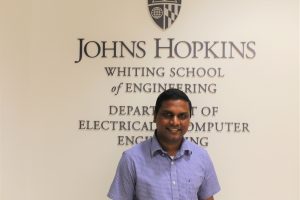
Explaining your thesis to a group of people who don’t have backgrounds in engineering can be difficult. Now imagine doing so in a mere three minutes with only a single PowerPoint slide.
That is the challenge that Pramuditha Perera, a fourth-year ECE doctoral student, faces as he enters the finals of Johns Hopkins’ Three Minute Thesis Challenge, an academic research communications competition to be held during the afternoon of April 17 at Mountcastle Auditorium in Johns Hopkins Hospital.
Developed by the University of Queensland in Australia, the Three Minute Thesis Challenge is aimed at helping doctoral students hone their communications skills so they can succinctly and accurately describe their work – and its importance – to those who are not experts in that field. Organized by the Johns Hopkins School of Medicine’s Development and Career Office, the competition is open to doctoral students from the schools of Medicine, Nursing, Arts & Sciences, Public Health, Education, and Engineering.
Perera, whose advisor is ECE Assistant Professor Vishal M. Patel, advanced to the finals after excelling during the competition’s preliminary round, held on April 4. He had seen friends at other universities participate in the competition, and when he found out that Johns Hopkins had its own version, Perera thought it would be a fun and useful opportunity. He is one of two Whiting School students in the finals, with the other being Derek Van Dyke from the Department of Chemical and Biomolecular Engineering.
“We understand our research and the technicalities involved, but it’s important to learn how to communicate what we do in terms that non-engineers and scientists can understand. At the end of the day, when we graduate, we’ll be dealing with investors, managers, or coworkers who lack our technical background,” Perera said. “This is a challenging competition, and I think it’ll help me learn to explain what I do in layman’s terms.”
Perera’s research interests include computer vision, machine learning, novelty detection and biometrics. His main focus is on creating deep learning-based machine learning algorithms for active authentication and anomaly detection applications.
Still, with only three minutes to explain his work, Perera knows he can’t go too deep. So, just as he did in anticipation of the preliminary round, he plans to practice by racing against a stopwatch to make sure his presentation is fewer than three minutes. During the actual competition, exceeding that mark results in disqualification.
“I’m going to try to give the overview of my work,” Perera said. “I just want to convey the need for this type of research and why it is important, and then explain my general approach to the problems. I have to keep it simple; otherwise, people may have a hard time understanding and I might go over the time limit.”